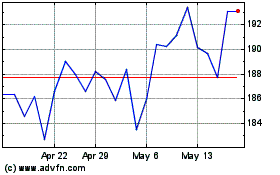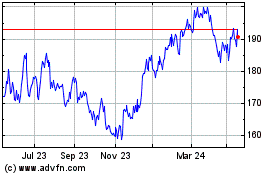Texas Blackout Boosts Australian Bank by Up to $215 Million
February 22 2021 - 10:38AM
Dow Jones News
By Joe Wallace
The deep freeze that plunged millions of Texans into darkness
last week produced a windfall of up to $215 million for Macquarie
Group Ltd., an Australian investment bank that is active in U.S.
power and gas markets.
The extreme weather froze wind turbines and oil-and-gas wells,
closed oil refiners and prompted power stations to trip offline,
sending a jolt through energy markets. Wholesale power prices
rocketed, as did spot prices for natural gas in Texas, Oklahoma,
Kansas and Arkansas.
The turbulence led to a bonanza for Macquarie's commodity
traders, who specialize in sending gas and electricity to clients
such as utility companies in unusual situations.
The bank bumped up its guidance Monday for earnings in the year
through March to reflect the windfall. It said that net profit
after tax would be 5% to 10% higher than in the 2020 fiscal year.
That equates to an increase of up to 273.1 million Australian
dollars, equivalent to around $215 million. In its previous
guidance, issued Feb. 9, Macquarie said it expected profits to be
slightly down on 2020.
"Extreme winter weather conditions in North America have
significantly increased short-term client demand for Macquarie's
capabilities in maintaining critical physical supply across the
commodity complex, and particularly in relation to gas and power,"
the bank said.
Macquarie describes itself as the second-largest marketer of
physical gas in North America behind BP PLC. The business, which
Macquarie has built out for over a decade, received a boost from
the acquisition of Cargill Inc.'s North America power and gas
division in 2017. It buys and sells on behalf of customers.
The Australian bank rents access to natural-gas pipelines and
electricity networks across the U.S., harnessing that capacity when
customers are in urgent need of fuel or power. That was the case
last week, when frozen pipelines and the closure of oil-and-gas
wells set off a scramble for natural gas among Texas power plants
and other consumers.
Macquarie sent large volumes of gas from the north of the U.S.
to the south, where the cold weather sent prices soaring last week,
a person familiar with the matter said.
At one point, natural gas changed hands for more than $900 per
million British thermal units at the ONEOK Gas Transportation hub
in Oklahoma, according to commodities data provider S&P Global
Platts. By Friday, prices at the hub had fallen back to about $14
per million British thermal units. That was still comparatively
high: Benchmark futures for U.S. natural gas, which are tied to
delivery at Henry Hub in Louisiana, have generally cost between
$2.50 and $3.50 per million British thermal units in recent
months.
Shares of Macquarie rose 3.4% in Sydney on Monday after the
company raised its profit outlook. They are now down 2.8% over the
past 12 months.
There have also been corporate losers from the blackouts. Shares
of Atmos Energy Corp. fell 3.1% Monday after the Dallas-based gas
supplier said it would have to pay between $2.5 billion and $3.5
billion for gas it bought at elevated prices in Texas, Colorado and
Kansas. Atmos may issue stock or raise debt to help to pay for the
purchases, it said Friday.
German energy company RWE AG said its 2021 earnings would be hit
by outages at the company's wind turbines, as well as from high
prices for electricity.
Write to Joe Wallace at Joe.Wallace@wsj.com
(END) Dow Jones Newswires
February 22, 2021 10:23 ET (15:23 GMT)
Copyright (c) 2021 Dow Jones & Company, Inc.
Macquarie (ASX:MQG)
Historical Stock Chart
From Oct 2024 to Nov 2024

Macquarie (ASX:MQG)
Historical Stock Chart
From Nov 2023 to Nov 2024
